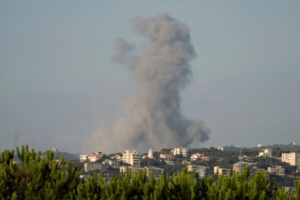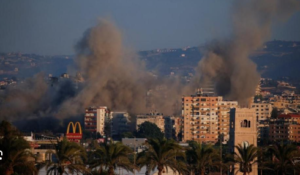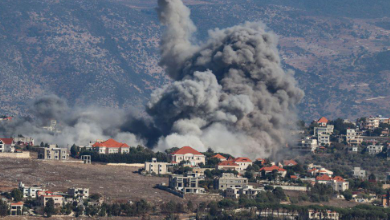Tags:
Israel, Hezbollah, Lebanon, Netanyahu, Ceasefire, Airstrikes, Middle East Conflict
Beirut/London – September 26, 2024 – Israel’s military campaign against Hezbollah in Lebanon has intensified, resulting in over 600 fatalities since Monday. Despite mounting international pressure for a ceasefire, Israeli Prime Minister Benjamin Netanyahu has ordered the Israel Defense Forces (IDF) to continue their offensive with “full force.” The violence has triggered fears of an all-out war, as diplomatic efforts struggle to take hold.
Escalating Violence: Hundreds Dead as Airstrikes Pound Lebanon
Lebanese authorities report that at least 92 people were killed in Israeli airstrikes on Thursday alone, marking one of the deadliest days in the recent escalation. Hezbollah confirmed the loss of key figures, including Mohammad Surur, head of the militant group’s drone unit, who was killed in a strike on Beirut’s southern suburbs.
The intense bombing campaign has wreaked havoc across Lebanon, with strikes targeting Hezbollah strongholds in southern Lebanon, the Bekaa Valley, and the Lebanon-Syria border. The latter aims to disrupt weapons supply routes into Hezbollah territory, according to Israeli military officials.
Netanyahu Defiant Amid International Calls for CeasefireDespite a 12-nation coalition led by the United States, the UK, and the European Union proposing a three-week ceasefire, Israel has firmly rejected the initiative. Prime Minister Netanyahu, speaking at the United Nations General Assembly in New York, declared that Israel will not halt military operations until it achieves its objectives, including the safe return of displaced Israeli citizens in the north.
“We will not stop. Israel’s security and the safety of our citizens come first. We are committed to securing the north, and we will not rest until our goals are met,” Netanyahu asserted.
Missiles, Displacement, and Growing Fears of War
As Israeli airstrikes rain down, Hezbollah retaliated by launching more than 130 rockets and missiles into northern Israel, targeting cities such as Kiryat Ata and Safed. The Israeli military intercepted a missile fired from Yemen, indicating that the conflict is drawing in additional regional players. This has only amplified fears that the situation could spiral into a broader regional war.

The humanitarian toll continues to rise on both sides. The UN estimates that more than 90,000 Lebanese civilians have fled their homes since Monday, adding to the 110,000 displaced by earlier rounds of fighting. Similarly, around 70,000 Israelis from the north have been displaced as Hezbollah’s rocket attacks escalate.
Israel Prepares for Ground Offensive
Israeli military leadership is preparing for the possibility of a full-scale ground operation in Lebanon. Israeli Air Force Commander Maj Gen Tomer Bar told troops on Thursday to be ready to support a “ground maneuver” if necessary, signaling that the conflict may extend beyond airstrikes.
Military experts note that Israeli airstrikes are designed to soften Hezbollah defenses in preparation for potential ground incursions. Lt Gen Herzi Halevi, Israel’s military chief, said, “We are taking every step to ensure that we can enter enemy territory with the highest level of success.”
Global Reactions and US Support
While Israel continues its military campaign, international leaders, including UK Prime Minister Sir Keir Starmer, have called for an immediate ceasefire to prevent the conflict from spiraling out of control. “We are witnessing the very real possibility of this conflict escalating into a war no one can control,” Starmer warned in New York.
Meanwhile, US Defense Secretary Lloyd Austin stressed the importance of diplomacy to resolve the situation, although he acknowledged the risk of “an all-out war” between Israel and Hezbollah.
Despite calls for restraint, Israel has secured an $8.7 billion military aid package from the United States. The package includes $3.5 billion for urgent military supplies and $5.2 billion for advanced defense systems, such as the Iron Dome and David’s Sling.
A War with No End in Sight?
As the conflict between Israel and Hezbollah intensifies, the prospects for a peaceful resolution appear bleak. While international diplomacy continues behind the scenes, both sides remain locked in a destructive cycle of retaliation, with no sign of de-escalation.
The human cost is mounting, and the shadow of a broader war looms over the region. For now, Israel’s airstrikes continue unabated, and the world watches with bated breath as the conflict edges closer to a tipping point.
The conflict between Israel and Hezbollah has seen a significant escalation, with Israeli Prime Minister Benjamin Netanyahu ordering continued strikes “with full force” against Hezbollah, despite international calls for a ceasefire. Over 600 people have been killed in Lebanon since the strikes intensified on Monday, with Hezbollah confirming the loss of a key commander, Mohammad Surur, in an Israeli airstrike on Beirut.

Despite a ceasefire proposal led by the U.S. and supported by the UK and EU, Israeli officials have rejected any immediate halt to military operations. Israel has launched over 1,600 strikes targeting Hezbollah’s infrastructure, including rocket launchers and military facilities across southern and eastern Lebanon, as well as the Syrian border to cut off weapons supplies to the group. Hezbollah, in turn, has retaliated with hundreds of rocket launches into northern Israel, exacerbating fears of a full-scale war that could be reminiscent of the devastating 2006 conflict.
Tensions remain high as both sides prepare for further military action. Israeli officials have hinted at the possibility of a ground invasion, moving tanks and troops toward the Lebanese border. Meanwhile, Hezbollah has escalated its rocket attacks, including strikes near major Israeli cities like Haifa and Safed. The situation has resulted in mass displacement, with 90,000 people fleeing their homes in Lebanon and thousands more in northern Israel seeking refuge.
Lebanese and international leaders, including those from Qatar and the U.S., continue to push for de-escalation. However, Hezbollah has indicated that it will only agree to a ceasefire if Israel halts its ongoing operations in Gaza as well. The conflict is intensifying at a time when international diplomacy faces challenges, with internal political divisions within Israel also complicating the situation






